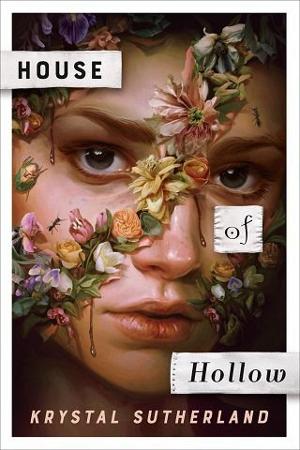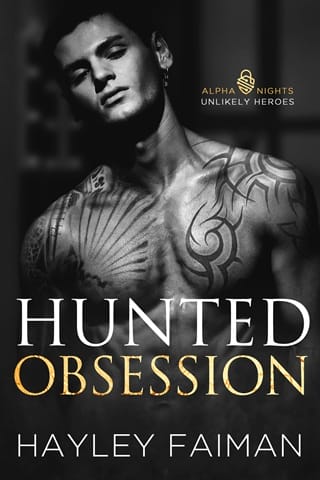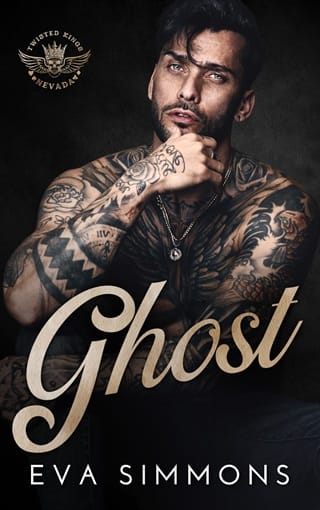Chapter 2
2
At home, I found my mother’s red Mini Cooper in the driveway and the front door ajar. It keened open and closed on its hinges, breathing with the wind. Wet footprints tracked inside. Our ancient demon of a cat, Sasha, was sitting on the doormat, licking her paw. The cat was older than me, and so threadbare and crooked she was beginning to look like a bad taxidermy job. She hissed when I picked her up—Sasha had never liked me or Vivi or Grey, and she made her feelings known with her claws—but she was too decrepit these days to put up much of a fight.
Something was off. The cat hadn’t been allowed outside for probably ten years.
“Cate?” I called quietly as I pushed the door open and stepped inside. I couldn’t remember when or why we’d stopped calling our mother Mum, but Cate preferred it this way, and it had stuck.
There was no answer. I put Sasha down and scuffed off my muddy shoes. Soft voices echoed down the stairs from the floor above, snippets of an odd conversation.
“That’s the best you can do?” my mother asked. “You can’t even tell me where they went? How it happened?”
A tinny speakerphone voice responded: a man with an American accent. “Listen, lady, you don’t need a PI, you need a psychiatric intervention.”
I followed the voices, my footfalls quiet. Cate was pacing by her bed, still in her emergency room scrubs, the top drawer of her nightstand open. The room was dark, lit only by a dim honey lamp. Night shift at the hospital called for blackout curtains, so the space always had a slightly sour smell to it from the constant lack of sunlight. In one hand, Cate held her phone. In the other, a photograph of herself with a man and three children. This happened every winter, in the weeks following the anniversary: My mother hired a PI to try and solve the mystery the police were no closer to unraveling. Inevitably, the PI always failed.
“So that’s it, then?” Cate asked.
“Jesus, why don’t you ask your daughters,” the man on the phone answered. “If anyone knows, it’s them.”
“Fuck you,” she said sharply. My mother rarely swore. The wrongness of it sent a prickle into my fingertips.
Cate hung up. A glottal sound escaped her throat. It was not the kind of noise you’d make in the presence of others. I was immediately embarrassed to have stumbled on something so private. I went to turn away, but the floorboards creaked like old bones beneath my weight.
“Iris?” Cate said, startled. There was a prick of something odd in her expression when she looked up at me—anger? fear?—but it was quickly replaced with concern when she spotted my muddy leggings. “What happened? Are you hurt?”
“No, I was mauled by a rabid pigeon.”
“And you were so scared that you shat your pants?”
I threw her a very funny pout. Cate laughed and perched on the edge of her bed and beckoned me with both hands. I went and sat cross-legged on the floor in front of her so she could fix my long blond hair into two braids, as she had done most mornings since I was little.
“Everything okay?” I asked as she ran her fingers through my hair. I caught the prickly chemical scent of hospital soap, overlaid with sweat and bad breath and other telltale hints of a fifteen-hour shift in the emergency room. Some people thought of their mothers when they smelled the perfume she wore when they were children, but for me, my mother would always be this: the cornstarch powder of latex gloves, the coppery tang of other people’s blood. “You left the front door open.”
“No, I didn’t. Did I? It was a long shift. I spent a long time with a guy who was convinced his family was controlling him with anal probes.”
“Does that count as a medical emergency?”
“I think I’d want some pretty rapid intervention if that was happening to me.”
“Fair point.” I sucked my bottom lip and exhaled through my nose. It was better to ask now, in person, than over text later. “Is it okay if I go out tonight? Vivi’s in town for a gig and Grey is flying in from Paris. I want to spend time with them.”
My mother said nothing, but her fingers slipped in my hair and tugged hard enough to make me gasp. She didn’t apologize.
“They’re my sisters,” I said quietly. Sometimes, asking to see them—but especially asking to see Grey—felt like asking for permission to take up shooting heroin as an extracurricular activity. “They aren’t going to let anything bad happen to me.”
Cate gave a short, complicated laugh and started braiding again.
The picture she’d been looking at was facedown on the blanket, like she hoped I wouldn’t notice it. I turned it over and studied it. It was of my mother and my father, Gabe, and the three of us girls when we were younger. Vivi wore a green tweed duffle coat. Grey was dressed in a Bordeaux faux-fur jacket. I was in a little red tartan coat with gold buttons. Around each of our necks hung matching gold heart pendants with our names pressed into the metal: IRIS, VIVI, GREY. Christmas presents from the grandparents we had been in Scotland to visit when the photo was taken.
The police had never found these items of clothing or jewelry, despite extensive searches for them.
“It’s from that day,” I said quietly. I hadn’t seen any photographs from that day before. I hadn’t even known there were any. “We all look so different.”
“You can . . .” Cate’s voice split, fell back down her throat. She let out a thin breath. “You can go to Vivi’s gig.”
“Thank you, thank you!”
“But I want you home before midnight.”
“Deal.”
“I should make us something to eat before you go to school, and you should definitely have a shower.” She finished my braids and kissed me on the crown of my head before she left.
When she was gone, I looked at the photograph again, at her face, at my father’s face, only a handful of hours before the worst thing that would ever happen to them happened. It had carved something out of my mother, shaved the apples from her cheeks and left her thinner and grayer than before. For much of my life, she had been a watercolor of a woman, sapped of vibrancy.
It had carved even more out of Gabe.
Yet it was the three of us girls who’d changed the most. I hardly recognized the dark-haired, blue-eyed children who stared back at me.
I’ve been told we were more secretive after it happened. That we didn’t speak to anyone but each other for months. That we refused to sleep in separate rooms, or even separate beds. Sometimes, in the middle of the night, our parents would wake to check on us and find us huddled together in our pajamas, our heads pressed together like witches bent over a cauldron, whispering.
Our eyes turned black. Our hair turned white. Our skin began to smell like milk and the earth after rain. We were always hungry, but never seemed to gain weight. We ate and ate and ate. We even chewed in our sleep, grinding down our baby teeth and sometimes biting our tongues and cheeks, so we woke with bloodstained lips.
Doctors diagnosed us with everything from PTSD to ADHD. We collected an alphabet of acronyms, but no treatment or therapy ever seemed to be able to reset us to how we’d been before it happened. We weren’t sick, it was decided: We were just strange.
People always found it hard to believe now that Grey and Vivi and I had come from our parents.
Everything about Gabe Hollow had been gentle, except for his hands, which were rough from his work as a carpenter and his weekend hobby of throwing mugs on a potter’s wheel. He’d worn cozy clothing from charity stores. His fingers were long and felt like sandpaper when he held your hand. He never watched sports or raised his voice. He caught spiders in plastic containers and carried them out to the garden. He talked to his kitchen herbs when he watered them.
Our mother was an equally soft woman. She drank everything—tea, juice, wine—only from the mugs my father had made for her. She owned three pairs of shoes and wore muddy Wellingtons as often as she could. After it rained, she picked up snails from the sidewalk and moved them to safety. She loved honey—honey on toast, honey on cheese, honey stirred into her hot drinks. She sewed her own summer dresses from patterns handed down to her by her grandmother.
Together, they’d worn waxed Barbour jackets and preferred walking in the English countryside to traveling overseas. They’d owned wooden hiking poles and hand reels for fishing in streams. They’d both loved to wrap themselves in wool blankets and read on rainy days. They both had light blue eyes, dark hair, and sweet, heart-shaped faces.
They were gentle people. Warm people.
Somehow, combined, they’d produced . . . us. We were each five eleven, a full ten inches taller than our tiny mother. We were each angular, elongated, sharp. We were each inconveniently beautiful, with high cheekbones and eyes like does. People told us as children, told our parents, how exquisite we were. The way they said it, it sounded like a warning—which, I supposed, it was.
We all knew the impact of our beauty and we all dealt with it in different ways.
Grey knew her power and brandished it forcefully, in a way I had seen few girls do. In a way I was afraid to mirror myself, because I had witnessed the repercussions of being beautiful, of being pretty, of being cute, of being sexy, and of attracting the wrong kind of attention, not only from boys and men but other girls, other women. Grey was an enchantress who looked like sex and smelled like a field of wildflowers, the human embodiment of late-summer evenings in the South of France. She accentuated her natural beauty wherever possible. She wore high heels and delicate lace bras and soft smoky eye makeup. She always knew the right amount of skin to show to achieve that cool-sexy look.
More than anything else, this is how I knew my eldest sister was different from me: She walked home alone at night, always beautiful, sometimes drunk, frequently in short skirts or low-cut tops. She walked through dark parks and down empty streets and along graffiti-smeared canals where itinerants clustered to drink and do drugs and sleep in piles. She did this without fear. She went to the places and wore the things that—if anything happened to her—would later prompt people to say she was asking for it.
She moved through the world like no other woman I knew.
“What you don’t understand,” she said to me once when I told her how dangerous it was, “is that I am the thing in the dark.”
Vivi was the opposite. She tried to banish her beauty. She shaved her head, pierced her skin, inked the words FUCK OFF! across her fingers, a spell to try and ward off unwanted desire from unwanted men. Even with these enchantments, even with a zigzag nose and a wicked tongue and unshaved body hair and the dark grooves beneath her eyes carved out by drink and drugs and sleepless nights, she was achingly beautiful, and ached after accordingly. She collected each wolf whistle, each smacked butt cheek, each groped breast, kept them all beneath her skin where they boiled in a cauldron of rage that she let out onstage on the strings of her bass guitar.
I fell somewhere between my sisters. I didn’t actively try to wield or waste my beauty. I kept my hair washed and wore no scent but deodorant. I smelled clean but not intoxicating, not sweet, not tempting. I wore no makeup and only loose-fitting clothing. I didn’t take up the hem of my uniform. I didn’t walk alone at night.
I went to put the photograph back in Cate’s open drawer. A manila folder, distended with paper, sat beneath her socks and underwear. I pulled it out, flicked it open. It was filled with photocopies of police files, their edges curled with age. I saw my name, my sisters’ names, caught snippets of our story as I riffled through, unable to look away.
The children claim to have no memory of where they have been or what happened to them.
Officer █████ and Officer █████ refuse to be in the same room as the children, citing shared nightmares after taking their statements.
The flowers found in the children’s hair are unidentifiable hybrids—possible pyrophytes.
The cadaver dogs continue to react to the children even days after their return.
Gabe Hollow insists that all three children’s eyes have changed, and that baby teeth have grown back in places where they were already lost.
My stomach pressed against my throat. I snapped the folder shut and tried to shove it back into the drawer, but it snagged on the wood and split open, heaving paper onto the floor. I knelt and gathered the sheets into a pile with shaking hands, trying not to look at its contents. Pictures, witness statements, pieces of evidence. My mouth was dry. The paper felt corrupted and wrong in my fingers. I wanted to burn it, the way you’d burn a blighted crop so the rot couldn’t spread.
And there, at the top of the stack of documents, I found a photograph of Grey at eleven years old, two white flowers—real, living flowers—growing out of the paper as if they were bursting from her eyes.
 Fullepub
Fullepub 



